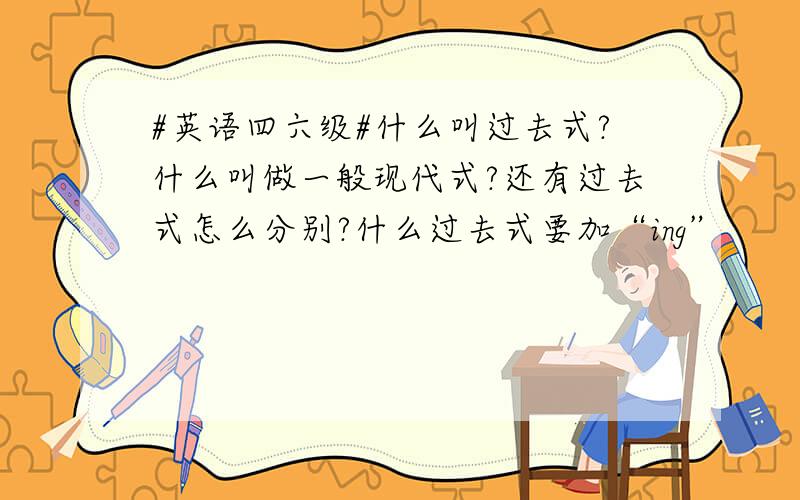#英语四六级#什么叫过去式?什么叫做一般现代式?还有过去式怎么分别?什么过去式要加“ing”
来源:学生作业帮助网 编辑:作业帮 时间:2024/11/15 07:57:58

#英语四六级#什么叫过去式?什么叫做一般现代式?还有过去式怎么分别?什么过去式要加“ing”
#英语四六级#什么叫过去式?什么叫做一般现代式?还有过去式怎么分别?什么过去式要加“ing”
#英语四六级#什么叫过去式?什么叫做一般现代式?还有过去式怎么分别?什么过去式要加“ing”
时态
名称\x09结构\x09常连用的词\x09主要用法\x09例句
一般现在时\x091 由be的is am are表示,之后接名词,形容词或介词.\x09every…,
sometimes,
always,never,
often, usually等.\x09一般现在时表示没有时限的持久存在的习惯性的动作或状态,或现阶段反复发生的动作或状态\x09陈述句:I am an office worker.
He is so lazy. They are at home now.否定句: I am not Tim.
She is not very beauiful.
They are not in the office.一般疑问句:Are you an office assistant? Is she beautiful?
\x092 由实意动词V构成,引导疑问句和否定句,用do或don’t.第三人称时用does或doesn’t,有does出现动词用原形;第三人称陈述句V后加s或es.\x09\x09\x09陈述句:I work in Shanghai.
He works at home.
Davy never watches TV at home.否定句: I don’t like the food in KFC.
Davy doesn’t like the food in KFC either.
一般疑问句:
Do you want a cup of coffee? Does she live near the subway station?
一般过去时.\x091由 be的过去式是 was或 were表示.Is\ am---was;are---were. \x09yesterday,
last week,
an hour ago,
the day before yesterday,
in 1997.\x09在过去时间里所发生的动作或存在的状态.\x09陈述句:I was a big boss.He was beautiful.
We were in Beijing last year.否定句: I was not at home at that moment.
We were not at work yesterday.一般疑问句: Were you a teacher?
Was she in the office last week?
\x092由V的过去式构成陈述句,疑问句和否定句用借助于did,有did出现动词用原形. \x09\x09\x09陈述句:I worked in Sunmoon.
We studied English there. He lived in HongKong.否定句: I didn’t work here.
They didn’t see me. She liked English a lot.一般疑问句: Did you go to America?
Did he work in Sunmoon?
时态
名称\x09结构\x09常连用的词\x09主要用法\x09例句
一般将来时\x091 任何人称+will+动词原形.\x09
tomorrow,
next year,
the month after next,
in two hours. \x09即将发生动作或状态.\x09陈述句:I will fly to KongKong tomorrow.
He will go with us.
We will arrive in Shanghai next week.否定句:I will never believe you again.
He will not come tonight.
We will not buy a car next year.一般疑问句:Will you go there by train?
Will he come tomorrow?
Will they live a five-star hotel?
\x092 is/am/are+going to+V原形,表示计划打算做什么事情.\x09\x09\x09陈述句:I’m going to go to Kongkong by air.
否定句:We are not going to buy a house here.一般疑问句:Are they going to change their jobs?
特殊疑问句:How are you going to tell him?
过去将来时\x09was/were going to +V原形\x09 \x09在过去将会发生的动作.\x09陈述句:I was going to buy a computer.
They told me that they were not going to go abroad.
否定句:I was not going to buy a computer.
\x09任何人称+would +V原形\x09\x09\x09He said he would come in in Shanghai.
I said I would buy you a car one day.
时态
名称\x09结构\x09常连用的词\x09主要用法\x09例句
现在进行时\x09is/am/are+Ving \x09now,
at the(this)momentLook!(放在句首)
Listen! (放在句首)\x09表示现在( 指说话人说话时) 正在发生的事情.\x09陈述句:I’m waiting for my boy friend.
He is doing the housework at home now.
We are enjoying ourselves.否定句:He is not playing toys.一般疑问句:Are you having dinner at home?
Is Tim cooking in the kitchen?特殊疑问句:What are you doing now?
Where are they having a meal?
过去进行时\x09was/were+Ving \x09at that time
at 10 o’clock last night
at that moment等过去具体的时间\x09过去一段时间正在发生的动作.\x09陈述句:I was doing my homework at that time.
We were having a party while he was sleeping.
否定句:He was not sleeping at 11 o’clock last night.一般疑问句: Were you watching TV at that time?特殊疑问句: What were you doing at that moment?
时态
名称\x09结构\x09常连用的词\x09主要用法\x09例句
现在完成时\x09have/has +done(过去分词)\x09already;
just(not just now)
yet;ever;never;
for two weeks;
for a year;
for several days;
since 2004
since last week \x09用来表示之前已发生或完成的动作或状态,其结果的确和现在有联系.动作或状态发生在过去但它的影响现在还存在;也可表示持续到现在的动作或状态.简单的说,就是动作已经发生对现在造成明显的影响.\x09陈述句:I have already told Davy. Davy has known this matter.
He has lived here for nearly 10 years.否定句:I haven’t finished my homework..
Tim hasn’t come yet.
We haven’t heard any news about him一般疑问句: Has he worked here since he came here?
特殊疑问句: How long have you worked in this company?
\x09特别注意:\x091. have/has always been+名词/形容词/介词:总是或一直是什么样子.He has always been a good father. I have always been busy.They have always been in America.
\x09\x092. have/has gone to:去了.He has gone to Beijing.
They have gone to the cinema.\x093. have/has been to:表示去过或到过.I have been to Canada. Have you been to Hongkong?Where have you been? I have never been here.
过去完成时\x09had + done(过去分词)\x09by the end of last year
by last year \x09动作发生在过去的过去. \x09陈述句:He said he had told Davy.
They told us they had finished the work.
He left the office after he had called Davy.否定句:She hadn’t had dinner before she went out.
一般疑问句:Had she learnt English before she moved here?
特殊疑问句:how many English words had he learnt by the end of last year?